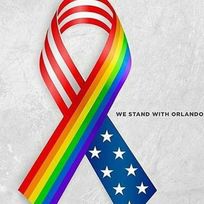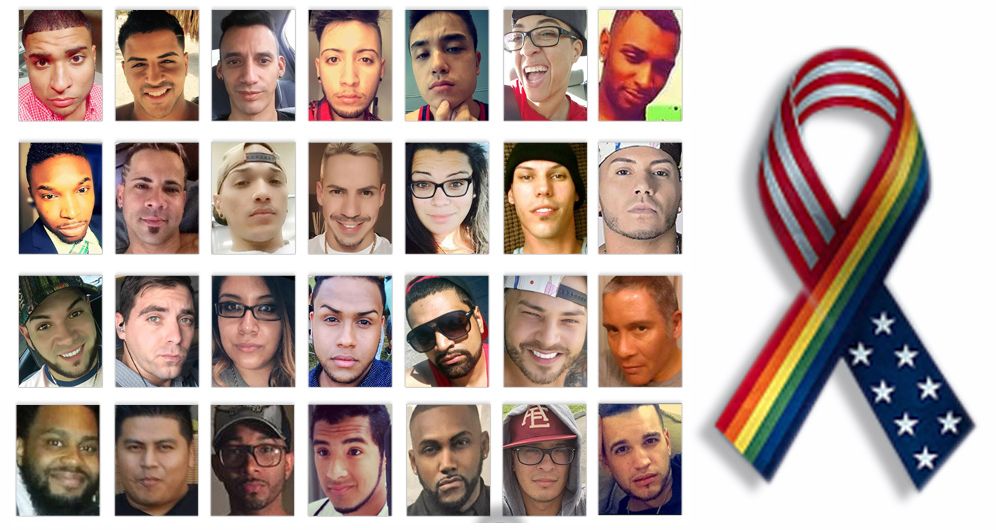 It was two years ago today, June 12, 2016, that our nation witnessed a mass-killing at the Pulse Nightclub in Orlando, Florida with 49 people killed and 53 others wounded. I was sickened by this news, but I also felt disheartened by the apathy and indifference of the majority of the American Christian church. (Note: Part of what is written in this blog was from writings of mine during that time period.) “People are suffering, and God’s people need to be there with them, loving them, and standing in the gap for them,” I thought. Wherever people are suffering, God’s people are called to stand by their side—in prayer and sacrificial loving actions. After the Orlando shooting in the Pulse nightclub, there were statements found in newspaper articles and op-eds that referred to the nightclub as a form of “church” for the LGBT community. It was a form of 'church' because it offered this community a respite and safe harbor to be themselves. One particularly meaningful quote was by a gay man who regularly went to Pulse: “While a lot of people turn to churches, LGBT communities are often forced to use nightclubs as our safe haven, and Pulse was mine. Although I had built armor to defend myself from the hatred that was spewed to me when I came out (including some from my own mother), the reality was that I still hated myself because of my identity as a gay man. It didn’t help that I had grown up in a church that had conditioned me to hate myself for loving other men.” These sentiments are reflected in countless stories, and they cause me grief over my silence and lament for the Church that I love. The Church is supposed to be the place for everyone to hear the Good News, but sadly, it has turned many away because the love of most has grown cold. Unfortunately, I have encountered, witnessed, and experienced similar stories. One statement I heard from a gay man, who has a great heart and loves God, was: “I would go to church, but I am not welcomed there.” While I found this disturbing, I also have to say that it is true. As I continued my reflection of this tragedy in my time with God, I have felt a burning in my heart to speak up for the LGBTQ community and to challenge the assumptions, interpretations, and prejudices that have polluted our message. For a while, I attempted to remain silent, preferring the status quo “peace” then to thrust myself into the fray. After all, I have personally witnessed the “bible slamming” that happens when someone speaks up from within the Christian community. However, the Pulse nightclub tragedy was a turning point in my life. How could I remain silent? The Anglican Bishop Desmond Tutu wrote, “If you are neutral in situations of injustice, you have chosen the side of the oppressor. If an elephant has its foot on the tail of a mouse and you say that you are neutral, the mouse will not appreciate your neutrality.” As I continued to pray in the aftermath of the Pulse nightclub tragedy, I was led to the story of Esther, who was a Jewish queen of the Persian king Ahasuerus. She was out of place and living between two different worlds—of the Jews and the Persians. Her uncle Mordecai informed Esther of a decree that would exterminate the Jews. Esther was reluctant to speak because of her fear of the King, but Mordecai replied to her: “Do not think to yourself that in the king's palace you will escape any more than all the other Jews. For if you keep silent at this time, relief and deliverance will rise for the Jews from another place, but you and your father's house will perish. And who knows whether you have not come to the kingdom for such a time as this?” (4:13-14). I believe I was led to this passage because it was time for me to speak ”for such a time as this.” If I did not speak, then I am complicit in shutting the “door of the kingdom of heaven in people's faces” (Matthew 23:13). The church is quick to recite John 3:16, but neglects to understand the fantastic teaching found in the next verse: “For God did not send his Son into the world to condemn the world, but to save the world through him.” This verse is further illuminated in John 12:32 when Jesus says: “And I when I am lifted up from the earth, will draw all people to myself.” Notice that the message of God’s son is not condemnation, but acceptance for everyone! The Church, which bears the name of Christ, must share in dispensing the incredible grace and unconditional love that He demonstrated in His life, teachings, and death. In our acceptance of everyone, including the LGBTQI community, we must work together to strive toward holiness. We must remember that holiness is not made possible by works, but by faith alone (Romans 3:28-30). Paul states in Ephesians 2:8, “For it is by grace you have been saved, through faith--and this is not from yourselves, it is the gift of God.” Our faith calls us to accept His grace, which then unleashes the creative and regeneration works of the Holy Spirit in making us a new creation in Christ Jesus (2 Corinthians 5:17). If Jesus is the author and finisher of our faith (Hebrews 12:2), then should we not trust Him, not only for ourselves but also for others, to finish that which He has started (Philippians 1:6)? If we ere, let us always do so in being too loving and too gracious. I have never read a story in the Bible where anyone was condemned by God for loving or sharing too much. Since that terrible day on June 12, 2016, I have come to trust more and more in God's amazing grace, not just for me, but for everyone! I have come to understand that there are many more questions then answers on this side of eternity. But, I am comforted in knowing that God is big enough to handle them all and His love is strong enough to calm us in the midst of the unknown. As the old song goes, "My hope is built on nothing less Than Jesus Christ, my righteousness; I dare not trust the sweetest frame, But wholly lean on Jesus’ name." We must remember these wise words: “In essentials, unity; in nonessentials, liberty; in all things, love.”
0 Comments
This Doesn't Fit6/9/2018  Scene from the movie "Big" where the character played by Tom Hanks turns back into a kid. The clothes of the "adult" do not fit the "kid." Scene from the movie "Big" where the character played by Tom Hanks turns back into a kid. The clothes of the "adult" do not fit the "kid." David fastened on his sword over the tunic and tried walking around, because he was not used to them. "I cannot go in these," he said to Saul, "because I am not used to them." So he took them off. – 1 Samuel 17:39 Growing up and even today, I always appreciate the story of the young David, before he became king. The youngest of his siblings, David wasn’t even considered by his father, Jesse, as one who might be anointed king over Israel. Indeed, the prophet Samuel when looking at the other brothers was initially inclined to anoint one who seemed like the natural fit, but God had other intentions. In 1 Samuel 16:7 we read, “But the Lord said to Samuel, “Do not look on his appearance or on the height of his stature, because I have rejected him. For the Lord sees not as man sees: man looks on the outward appearance, but the Lord looks on the heart.” And so, Samuel asks Jesse if there is another son and he summons David who is anointed King. One of the greatest lessons that I have learned about God through the process of accepting myself, with all of my paradoxes, is how God's grace is so AMAZING. Just as God did with David, so he does with each of us—He looks at our hearts, our character, and our truest selves. In speaking to the prophet Jeremiah, God says: "Before I formed you in the womb I knew you, before you were born I set you apart; I appointed you as a prophet to the nations” (Jeremiah 1:5). God knows us, loves us, and has a plan for us. Learning to accept this profound reality is essential in understanding who we truly are. It also requires us to unlearn what we have thought about ourselves for so long. A sociologist name Charles Cooley formulated the concept of the “looking glass self.” In layman’s terms, it basically posits that our identity is shaped by what we think the most important person(s) in our lives think about us. Throughout our lives, we have many important people: parents, family, and friends. Also, sometimes we make people important, who really are not in the long run. Nonetheless, our thoughts and feelings about the perception of others about ourselves shape how we see ourselves and ultimately who we become. Proverbs 23:7 (KJV) states, “For as he thinketh in his heart, so is he.” Unfortunately, our thinking is not always our own and is not shaped by the one who truly matters—God. We take on the perceptions of others and call it 'truth', without ever examining whether it is the right fit, or truth, for us. In 1 Samuel 17, we see that the Israelites are being tormented by Goliath. Day and night he is demeaning them and they begin to see themselves as he calls it. They buy into the deception and they are afraid. In verse 16, David enters on to the scene and cannot believe what he is seeing and hearing, not from Goliath, but from his fellow Israelites. And so, David steps forward to take on Goliath. David was armed with a God-given identity and the assurance that came with it, but immediately his fellow countrymen tried to dissuade him from going out to challenge Goliath. Then in verses 38-39, King Saul gets David to put on his personal armor, but it did not fit David. Instead, he went out dressed like the shepherd boy that he was and brought down Goliath with five smooth stones. David knew who he was because it was just confirmed by the prophet one chapter earlier. He had a God-given identity and because of that he knew what fit him and what did not. He did not succumb to the temptation to fit in with the others, rather he embraced his uniqueness and shed the hand-me-down armor of those were too afraid to fight for themselves. Of course, David had to ultimately wait for 20 years before finally becoming king of Israel. Perhaps this was necessary to truly learn his God-given identity and to embrace it, so that he would truly be “a man after God’s own heart” (Acts 13:22). How many times are we like David with others trying to impose their identities upon us? How many time are we unlike David and willingly accept those identities because we want to fit in or it is simply easier? For so many years, my identity was based on trying to make other people happy and it came at a great expense because it didn’t make any of us happy. Most people are uncomfortable in their own “armor” to even think about your “armor.” As I tell people often, no one is thinking about you as often as you are thinking about yourself. Above is a clip from the movie, "Love, Simon." In the scene, the mother is played by Jennifer Garner, and she affirms her son's identity after he came out to his family as gay. She tells him, "As soon as you came out, you said, “Mom, I’m still me.” I need you to hear this. You are still you, Simon. You are still the same son who I love to tease, and who your father depends on for just about everything. And you’re the same brother who always complements his sister on her food, even when it sucks. But you get to exhale now, Simon. You get to be more you than you have been in, in a very long time. You deserve everything you want."
I truly believe this is a message that God wants ALL of us to hear: "You are still YOU...you are still the same child that I love" and He wants us to be the best version of ourselves because He thinks we are AWESOME! Don't let anyone tell you that you are not. Learning to be comfortable in your own skin is difficult. Simon states it pretty succulently in the movie, "Who you are to the world is pretty terrifying because what if the world doesn’t like you?" Just remember: The world didn't accept Jesus--but He is still the King. The world does not get to define YOU and the world does NOT have the last word! AuthorDr. Rob Weinstein is the Founding/Senior Pastor of Bethany Grace Community Church in Bridgeton, NJ. He is also a Professor of Business Studies/Academic Director/Chair of Human Resource Management Studies. He is the Founder of the M25 Initiative, a nonprofit dedicated to ending homelessness and food insecurity in Cumberland County, NJ. Archives
January 2023
Categories
All
|
In addition, my thoughts and opinions change from time to time I consider this a necessary consequence of having an open mind.
This weblog is intended to provide a semi-permanent point in time snapshot and manifestation of the various thoughts running around my brain, and as such any thoughts and opinions expressed within out-of-date posts may not the same, nor even similar, to those I may hold today.
Feel free to challenge me, disagree with me, or tell me I’m completely nuts in the comments section of each blog entry, but I reserve the right to delete any comment for any reason whatsoever (abusive, profane, rude, or anonymous comments) – so keep it polite, please.
This blog disclaimer is subject to change at anytime without notifications.




 RSS Feed
RSS Feed